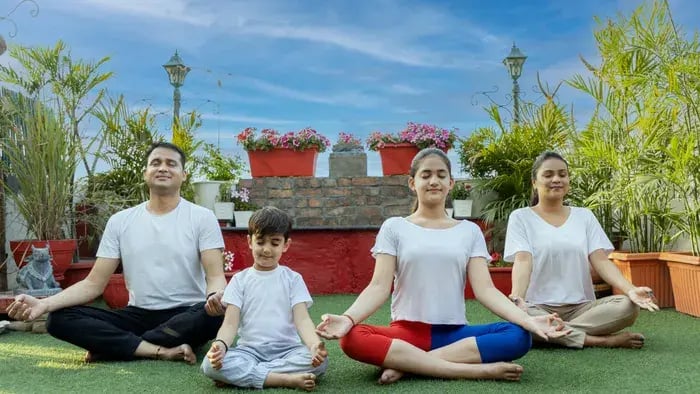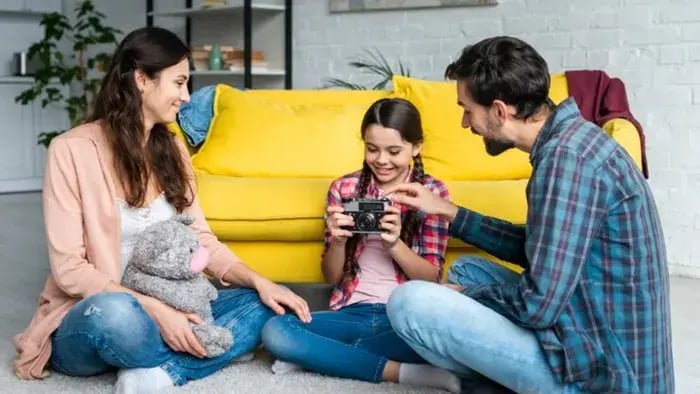- Listen To The Sound
- Breathing Buddy
- Noticing Walks
- Family Gratitude Practice
- Be A Role Model
- Encourage Delayed Gratification
- Taking A Mindful Pause
Introduction
Patience is a valuable trait in the 21st century, with its preference for instant gratification and feedback. As the duration of videos and reels goes down, so does the attention span of children. Consequently, children do not get the time to play, nor do they have the focus to enjoy their leisure mindfully.
The final result is a constant cycle of mindlessness and a sedentary lifestyle. To avoid such relatives of chronic diseases, parents must engage their children in physical activity and try mindful meditation. Only mindfulness can develop patience in children. You may think that involves coaxing your child to sit still for an hour by focusing on a candle on the first day.
But, be rest assured that is not the case. To make sure children engage in mindfulness, a variety of activities and breathing exercises are available to enthrall and delight them. All you need to do is give the following activities and tips to try to introduce kids to mindfulness and develop patience in them.
Mindfulness Practices And Activities For Kids
1. Listen To The Sound
For this game, ask your child to focus on the sound you are making or playing. The duration can start with 30 seconds or 1 minute before increasing. It can be the gentle rolling of a bell, or falling drops of water, or the soft swishing of ocean waves. Ask them to count or focus on them till the music stops playing. When the music's over, ask them what they were thinking.
2. Breathing Buddy
Since young children often find it hard to focus on their breaths without letting their minds wander, it is ideal to use a buddy for this exercise. It can be a family member, a friend, or even a toy. Make the buddy lie on the ground by putting it or their head on your child’s tummy. Ask your child to focus on its rise and fall with every breath they take and release. This will help your child focus on their breaths.
3. Noticing Walks
Noticing walks are excellent for making your child more mindful of their surroundings and employing all their sensory organs. Go out for a walk with your kids and notice things that you never saw there before. It can be a squirrel, a new plant, or even the sound of a lawnmower. Also, try practicing mindfulness breaks, in which both your kid and you fall silent for a second, and try to notice as many new things as possible. They can be for a minute or so, depending on your child’s eagerness and commitment.
4. Family Gratitude Practice

Family gratitude practice is a wonderful way of ending the day on a positive note. Either during family bonding time or mealtime, make sure to take some time to go around the table and have every family member share something they were grateful for. This often leads to sharing many fun stories and forming fond family memories. And on the worst days, they help children and adults focus on what they already have and must appreciate.
Tips On Using Mindfulness To Develop Patience In Children
1. Be A Role Model
To inculcate patience and mindfulness in kids, it is ideal for parents to lead the way. Children learn best when they mimic their parents' actions and choices, so why not make good use of it? Model patience and a persevering mindset and try not to lose your temper even in situations of conflict. When children observe a healthy way of expressing negative emotions, they try to emulate it.
2. Encourage Delayed Gratification

Encourage and appreciate delayed gratification in your household more than instant satisfaction. While winning a lottery or chancing upon treasure may sound exciting to kids, expecting it to happen will not do anybody a favor. Instead, it is better to study, live mindfully, and fulfill the necessary goals in life to crack their dream career. Similarly, appreciate your child’s perseverance and mindful hard work even if they do not win in their first attempt. It will make success much sweeter for them.
3. Taking A Mindful Pause
Teach your kids the importance of taking a mindful pause before speaking. Almost every human responds to stimulus immediately, be it good or bad. Just like an award winner tears up while being applauded, a negative remark automatically invites a biting response. An easy way of regulating emotional responses is by practicing taking a mindful pause. Guide your kids to take a mindful pause before responding to any stimuli. This helps lessen negative responses and lack of composure in kids, promoting patience and perseverance instead.
Conclusion

Mindfulness is not achieved by any shortcut method but by daily practice. Regular engagement in mindfulness exercises and your child’s willingness will determine how quickly they develop patience. And since enforcing or coaxing older kids will have no positive impact, it is ideal to let them try the creative activities listed above and make their own choices.
Kaushiki Gangully is a content writing specialist with a passion for children's nutrition, education, and well-being. With more than five years of writing experience and a science-based background, she provides nuanced insights to help families raise happy, healthy kids. Kaushiki believes in making learning and healthy eating fun, empowering parents with practical, easy advice.
The views expressed are that of the expert alone.
The information provided in this content is for informational purposes only and should not be considered a substitute for professional medical advice, diagnosis, or treatment. Always seek the advice of your physician or another qualified healthcare provider before making any significant changes to your diet, exercise, or medication routines.
References
https://nps.cmr.ac.in/blog/why-teach-kids-patience-and-how-to-do-it/
















